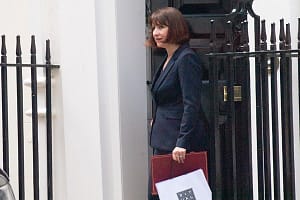When energy bills are shooting up, it costs considerably more to fill up your car with petrol and buying essentials like a loaf of bread and a pint of milk has become more expensive, it’s no wonder that retail sales have plunged.
Russ Mould, investment director at AJ Bell, said: “The stock market has been pricing in this trend for some time, as reflected by the FTSE 350 retail sector having declined by 22% in value year to date.
“Only two FTSE 350 retailers are sitting on a higher share price versus the start of January – that’s Vivo Energy which is in the process of being taken over and the other is WH Smith which is enjoying a recovery in travel activity and has a surprisingly resilient high street operation.
“The share price movements tell you what the market thinks about the consumer spending outlook. It’s easy to cut back on items like greetings cards and clothes, as evidenced by big declines in the shares of Moonpig and Marks & Spencer.
“The home improvement revival seen throughout the pandemic is at danger of losing momentum, with B&Q owner Kingfisher down by a fifth and homewares sellers Next and Dunelm also falling a lot. We all stocked up on laptops and new TVs during lockdown, so Currys might find it harder in the coming months to keep growing sales.
“But the one company that stands out from the crowd is B&M European Value which is down nearly 18% year to date. One might have thought cash-strapped consumers looking to save money would trade down to cheaper items which would benefit value retailer B&M, but the stock market clearly disagrees.
“So, is chief executive Simon Arora getting out before everything turns ugly? News that he will leave the business in 12 months’ time is perhaps not a complete surprise given his family investment vehicle SSA sold £234 million worth of shares in B&M three months ago. That was a signal that Arora was thinking about the future and one that perhaps was less hands-on than his current role.
“He has run the business for the past 17 years and made it one of the biggest modern success stories in UK retail. The 5% share price decline on news of his forthcoming departure goes to show that the market doesn’t want him to go, although one must also factor in the latest retail sales figures as weighing further on the share price.
“The ONS’ retail sales data is a wake-up call that life is going to be tough for shops – virtual or physical – in the coming months. Once those vastly increased energy bills hit the doormat and households take time to reassess their financial situation, there is every chance that retail sales could get even worse.
“Big ticket items look particularly vulnerable, including sofas and airline tickets.
“Pubs will be also watching the trends closely as while beer drinkers may be less willing to trade down to cheaper products, there is still the question of getting them through the door in the first place.
“More people returning to working from the office theoretically increases the chances of pubs enjoying a tick-up in sales thanks to people socialising once their shift is over. But that post-work pint may have to become a less frequent treat if inflation keeps ticking up.
“The gloomy outlook for UK retail caps off a frustrating post-Easter four-day session for equities, with the FTSE 100 slipping 0.3% on Friday which means it has essentially made no progress on the week.”





Leave a Comment